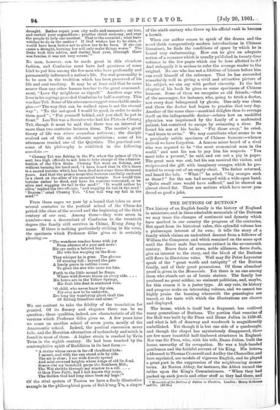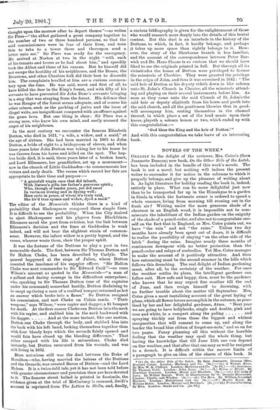THE DUTTONS OF DUTTON.*
THE history of an English family is the history of England in miniature, and in these admirable memorials of the Datong we may trace the changes of sentiment and dynasty which have marked in our country the progress of the centuries. But apart from its historical value, this splendid volume has a picturesque interest of its own ; it tells the story of a family which claims an undoubted descent from a follower of - William the Conqueror, and which remained on the same spot until the direct male line became extinct in the seventeenth century. Brave feats of arms, noble alliances, fierce duels, give an interest to the story, and the blood of the Duttons still flows in illustrious veins. Well may Sir Peter Leycester speak of the "great worth and antiquity" of the Dutton family, and of their great possessions. Of these abundant proof is given in the Memorials. Yet there is no one among them who stands out as of heroic stature. The family has produced no great soldier, no eminent politician, and, maybe, for this reason it is a juster type. At any rate, its history and progress make an interesting volume, and we cannot too highly praise the learning wherewith the genealogies are traced, or the taste with which the illustrations are chosen and displayed.
The house, which is itself but a fragment, has outlived many generations of Duttons. The portion that remains of the Hall was built by Sir Piers and Dame Julian in 1539-42, and what is left of doorway and woodwork is magnificently embellished. Yet though it is but one side of a quadrangle, and though the chapel has mysteriously disappeared, there are few more beautiful half-timbered structures in England. Nor was Sir Piers, who, with his wife, Dame Julian, built the house, unworthy of its occupation. He was a high-handed gentleman and the faithful servant of his King. His letters, addressed to Thomas Cromwell and Audley the Chancellor, and here reprinted, are models of vigorous English, and he played a great part in the suppression of the neighbouring mons& teries. At Norton Abbey, for instance, the Abbot turned the tables upon the King's Commissioners. "When they had packed up such jewels and other stuff as they had there, and • Memorials of the Dutton, of Dutton in Cheshire. London : Henry Saber= and Co. [522,,]
thought upon the morrow after to depart thence "—so writes Sir Piers—" the abbot gathered a great company together to the number of two or three hundred persons, so that the said commissioners were in fear of their lives, and were fain to take to a tower there and thereupon send a letter unto me." Sir Piers was ready for the emergency. He arrived at Norton at two in the night "with such of his tenants and lovers as he had about him," and speedily took the Abbot and three of his canons. But he himself did not escape the hostility of his neighbours, and the Donee, the Breretons, and other Cheshire folk did their best to discredit him. The complaints levelled at him are a curious commen- tary upon the time. He was said, worst and first of all, to have killed the deer in the King's forest, and with fifty of his servants to have prevented Sir John Done's servants bringing in a stag that was straying from the forest. His defence that he was" Ranger of the forest seems adequate, and of course his other crimes, such as the packing of juries and the issue of illegal writs, are insignificant compared with an offence against the game laws. But one thing is clear: Sir Piers was a strong man, who knew his own mind, and easily aroused the anger of his neighbours.
In the next century we encounter the famous Elizabeth Dutton, who died in 1611, "a wife, a widow, and a maid," at the age of sixteen. She had been married in 1605 to John Dutton, a bride of eight to a bridegroom of eleven, and when three years later John Dutton was taking her to his home he was thrown from his horse and killed on the spot. The hap- less bride died, it is said, three years later of a broken heart, and Lord Ellesmere, her grandfather, set up a monument— now in the church of Little (1addesden—to commemorate her virtues and early death. The verses which record her fate are appropriate to their time and purpose :—
" A gratefull virgin once that did inherit,
With Nature's gifts her father's generous spirit; Who, though of tender years, yet did excel In vertnow; liveing and in dyeing well; Here rests in peace, of whom it's truly said,
She liv'd true spouse and widow, dyed a maid."
The editor of the Memorials thinks there is a kind of probability that Shakespeare composed these simple lines. It is difficult to see the probability. When the City desired to eject Shakespeare and his players from Blackfriars, Ellesmere saved the poet from eviction, but the link between Ellesmere's decision and the lines at Gaddesden is weak indeed, and will not bear the slightest strain of common- sense. However, the infant widow is a pretty legend, and the verses, whoever wrote them, show the proper spirit.
It was the fortune of the Duttons to play a part in two memorable duels. The first, between Sir Thomas Dutton and Sir Halton Cheke, has been described by Carlyle. The quarrel happened at the siege of Julien, where Dutton resented the insolence of his supsrior officer. "Sir Halton
Cheke was next commander to Sir Edward Cecil "—so runs Wilson's account as quoted in the Memorials—" a man of
a gallant and daring courage in the difficultest enterprises; who, speaking to Sir Thomas Dutton (one of the captains under -his command) somewhat hastily, Dutton disdaining to be snapt up (being a man of a crabbed temper) returned as hot an answer which broke into a flame." So Dutton resigned his commission, and met Cheke on Calais sands. "Their weapons," says Wilson, "were rapier and dagger, a fit bouquet for death. At the first course Cheke ran Dutton into the neck with his rapier, and stabbed him in the neck backward with his dagger And at the same instant, like one motion, Dutton ran Cheke through the body, and stabbed him into the back with his left hand, locking themselves together thus with four bloody keys which the seconds fainly opened and would fain have closed up the bleeding difference." That either escaped with his life is miraculous. Cheke died instantly, but Dutton recovered from his wounds, and was still living in 1632.
More notorious still was the duel between the Duke of Ilatnilton—who, having married the heiress of the Buttons and the Gerarde, was created Baron of Dutton—and the Lord
Rohm. It is a twice-told tale, yet it has not been told before with greater circumstance and precision than are here devoted to it. The famous street ballad is printed in facsimile, the evidence given at the trial of McCartney is resumed, Swift's account is reprinted from The Letters to Stella, and, finally, a curious bibliography is given for the enlightenment of those who would research more deeply into the details of this brutal contest. But this duel is an interlude in the history of the Buttons, to which, in fact, it hardly belongs, and perhaps it takes up more space than rightly belongs to it. How- ever, the story of the Sherborne branch is less familiar, and the account of the correspondence between Peter Bar- wick and Dr. Hans Sloane is so curious that we should have liked to see the originals printed in full. But through all its vicissitudes the house of Dutton were privileged to license the minstrels of Cheshire. They were granted the privilege in the reign of John, and thus it was exercised in 1642: "The said heir of Dutton or his deputy rideth down in like solemn unto St. John's Church in Chester, all the minstrels attend. ing and playing on their several instruments before him. As soon as they come unto the said Church of St. John's the said heir or deputy alighteth from his horse and goeth into the said church, and all the gentlemen likewise that in good- will accompany him, seating themselves in the chancel thereof, in which place a set of the loud music upon their knees, playeth a solemn lesson or two, which ended up with this congratulation :-
'God God bless the King and the heir of Dutton."
And with this congratulation we take leave of an interesting book.



































 Previous page
Previous page